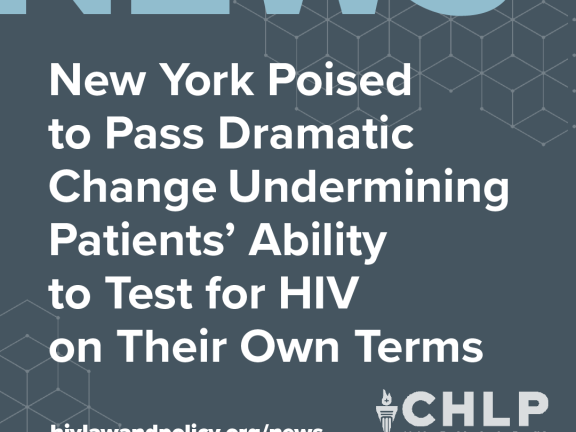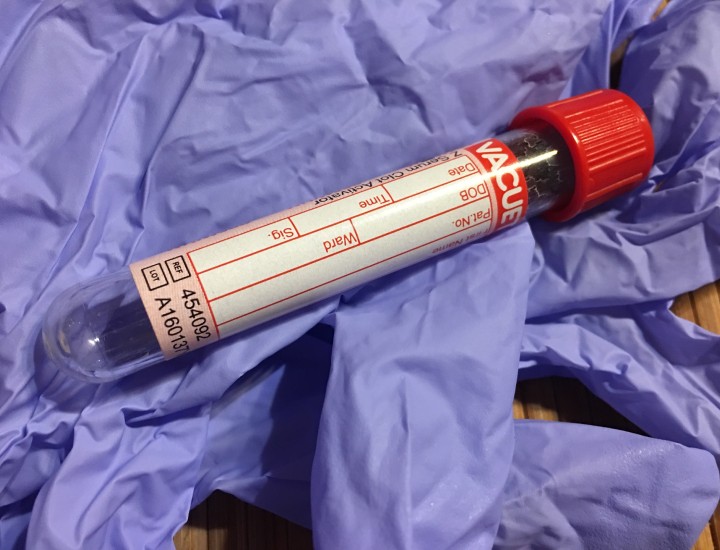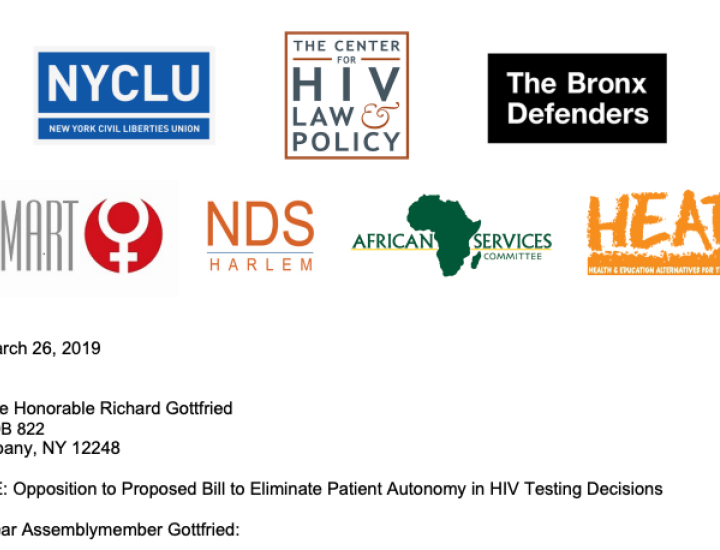News Release: New York Legislature, Governor Hochul Poised to Pass Dramatic Change Undermining Patients’ Ability to Test for HIV on Their Own Terms


New York Legislature, Governor Hochul Poised to Pass Dramatic Change Undermining Patients’ Ability to Test for HIV on Their Own Terms
A coalition of local and national HIV, LGBTQ, and civil liberties advocates successfully defeated the proposal from being included in New York’s FY 2025 budget, but legislators are moving a standalone bill threatening to upend patients’ rights
(NEW YORK) -- On May 6, the New York State Assembly and Senate will reconvene after a two-week recess following the agreement on a final Fiscal Year 2025 state budget. S7809, a bill introduced by State Senator Brad Hoylman-Sigal to amend provisions of New York’s HIV testing law is now scheduled for a floor vote by the upper house. The legislative proposal would fundamentally change how patients in New York are notified about HIV testing by removing the provision for affirmative informed consent.
Earlier this year, Governor Kathy Hochul originally included the proposal in Section 4 of Part T from the Executive Health and Mental Hygiene (HMH) Fiscal Year 2025 budget legislation. However, after legal and policy experts on HIV, LGBTQ rights, and sexual health raised a series of concerns with the proposed changes to how notice can be provided before New Yorkers receive an HIV test, it was struck from the final budget agreement.
According to current New York law, all patients must be, at minimum, orally notified before a medical provider performs an HIV test. If an individual cannot consent, medical providers must then directly notify a person authorized to consent to their health care. Additional key points of information must be shared before performing an HIV test, including the fact that HIV testing is voluntary, test results are confidential, and individuals have the right to decline testing. Providers must also share information about how HIV is transmitted, the treatment available to people living with HIV, and that it is illegal to discriminate against people because of their HIV status. Providers must offer HIV testing to all New Yorkers ages 13 and up.
The proposal up for a vote by the State Senate would remove the legal requirement that a provider directly notify and engage with a patient before they’re tested for HIV. S7809 would allow, “prominently displayed signage, by electronic means or other appropriate form of communication,” to inform patients they will be tested for HIV. The proposal is being advanced without data to support such a dramatic shift in HIV testing policy. There is no research suggesting that eliminating direct notice and informed consent before testing improves the health outcomes of people living with HIV or increases the number of people retained in HIV treatment.
On National Black HIV/AIDS Awareness Day in February, the New York State Department of Health recognized that medical mistrust and experiences of racism and discrimination have intensified racial inequities in HIV diagnoses. Nationally, as well as in New York, Black and Latinx people are more likely to be diagnosed with HIV than their white peers. 75.6% of newly diagnosed people in New York State are either Black or Latinx. It’s unclear how testing people without their knowledge or consent would address legacies of medical discrimination and mistrust experienced by LGBTQ New Yorkers, Black, and Latinx people, and women of color.
A similar effort to change New York's HIV testing law was defeated in 2020 after advocates for sexual health, LGBTQ rights, and other legal and policy organizations raised the alarm about the consequences of eliminating direct notice and informed consent before testing.
“Lowering the level of consent for HIV testing jeopardizes the vital rights of individuals to make fully informed decisions about their health,” said Jose Abrigo, HIV Project Director at Lambda Legal. “An HIV diagnosis is not just a medical condition; it has profound legal implications, including privacy rights and potential discrimination. Informed consent ensures that individuals understand these impacts and agree to testing under clear terms. By opposing the lowering of the standard, we stand firm on the principle that every individual deserves autonomy and comprehensive understanding of the legal ramifications associated with their health decisions.”
“In the global movement to fight for the rights of people living with HIV, we say, ‘nothing about us without us,’ because we as people living with HIV must be centered in all HIV policymaking,” said Elder Antionettea Etienne, Co-Chair of the New York State Chapter of Positive Women’s Network-USA. “I’m a health educator and test counselor, I’ve been testing people for HIV for almost 30 years. We cannot build health equity and justice by testing people without their knowledge or consent. People living with HIV are harmed by stigma and discrimination, and by our exclusion at every level of HIV policymaking. It’s outrageous to eliminate notice and consent before testing, and we will not stop until we defeat this measure.”
Christine Khaikin, Senior Health Policy Attorney at Legal Action Center said, “All New Yorkers should be allowed to make decisions about their own medical care. Despite the medical advances that have made HIV a treatable and preventable chronic disease, enormous stigma – including within the medical community – and discrimination persist. This bill runs counter to the movement to ensure patient-centered care, based in part on the concept of patient empowerment. Instead, it goes in the opposite direction by representing a continuation of the historic paternalistic attitude of medical professionals towards patients that will undoubtedly and disproportionately impact Black, brown, and working-class New Yorkers.”
“Ending HIV in New York requires not only a greater investment in resources but a shared understanding about how HIV stigma harms patients of all kinds,” said Jeffrey Birnbaum, MD, MPH, Executive Director, H.E.A.T. (Health & Education Alternatives for Teens), a sexual health clinic for adolescents and young adults at SUNY Downstate Health Sciences University. “HIV stigma thrives in ignorance and silence. We know the same health disparities perpetuate year after year because of systemic barriers to testing and treatment. A lack of trust between a patient and their provider is one of those barriers, and we must act now to protect that fragile trust by prioritizing, not jettisoning, human conversations between health care providers and those they serve.”
“Throwing out our fundamental right to decide how or when we receive an HIV test by allowing screening to happen without direct notification runs against all of our best practices for ending the HIV epidemic,” said Amir Sadeghi, Policy and Advocacy Manager, CHLP. “HIV is still a heavily stigmatized disease that can confront marginalized New Yorkers with collateral legal consequences. That’s why we should be encouraging dialogues between medical providers and their patients about sexual health, HIV, and STIs. The proposal being considered by the legislature not only risks accelerating legacies of medical racism and mistrust, it conflicts with the principles enshrined in the New York Patients’ Bill of Rights.”
“People living with HIV/AIDS have consistently faced barriers to accessing services and have long been on the receiving end of discrimination and misinformation surrounding their healthcare and needs,” said Heron Greenesmith, Deputy Director of Policy at Transgender Law Center. “Patients should be able to make well-informed medical decisions and have a clear understanding of their rights. Amendments like S7809 make it more difficult for people across language and ability to receive comprehensive care.”
“When I was first diagnosed with HIV in 1995, I knew nearly nothing about HIV. I had to go out of my way to learn about HIV and how it changed every aspect of my life and my family’s life. Why would we go back to those days by allowing HIV testing to happen without a direct conversation between doctors and their patients?” said Susan Rodriguez, Founding Director of Sisterhood Mobilized for AIDS/HIV Research & Treatment (SMART). “We need more education, resources, and engagement between people and their providers. That’s why I founded SMART over 25 years ago. We can only end HIV stigma and how it affects women living with HIV by bringing testing into the light. It’s not hard to imagine how allowing HIV testing to happen without people knowing or consenting to it creates conditions that put women and their safety at risk.”
##



